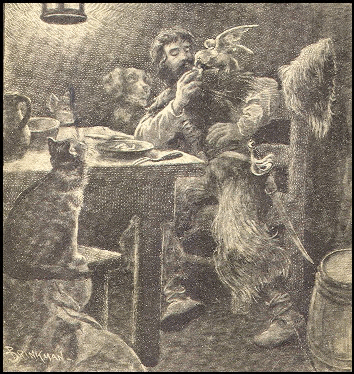I wondered who it could be, but I was still more than half asleep.
Then the voice screamed in my ear, "ROBIN CRUSOE!"
I sprang to my feet. I was frightened almost out of my wits. Who in the world could be speaking my name in that place?
No sooner were my eyes well open than I saw in the dim light of the moon my Poll Parrot sitting on a post quite close to my shoulder.
"Poor Robin Crusoe," he said. "Poor Robin Crusoe."
He was looking down at me as though in pity.
He was but repeating the words I had taught him. I knew that he was glad to see me, as I also was glad to see him.
I let him sit on my thumb as he often did at home. He rubbed his bill on my face and kept saying: "Poor Robin Crusoe! Where are you? Where have you been?" and other words that he knew.
I wondered how the bird had come to this place, for I had left him at the castle. I asked him; "Why are you here, Poll?"
But he answered me only by saying: "Poor Robin Crusoe! Where have you been?"
I surely believe that the bird loved me.
In the morning I carried him with me back to my castle.
As for the canoe, I would gladly have brought it back to its place in the little river. But I was afraid of being caught again in the furious currents; and so I left it in the safe cove on the other side of the island.
I AM HAPPY AS A KING
(я счастлив как король)
I HAD now had adventures enough for a time (у меня было достаточно приключений пока = уже достаточно приключений), and I felt very happy to be at home with my goats and other pets (и я чувствовал себя очень счастливым быть дома с моими козами и другими питомцами).

A few years before (несколькими годами ранее), I had started with keeping three kids that I had caught (я начал с содержания трех козлят, которых я поймал; to catch — ловить). Now I had a herd of three and forty goats (теперь у меня было стадо из сорока трех коз), some of them young, some old (некоторые из них /были/ старые, некоторые молодые).
I kept them in five little fields that I had fenced (я содержал их в пяти маленьких полях, которые я огородил; to keep — держать, не отдавать; хранить; сохранять; беречь; содержать; держать /животное/), at the foot of my castle hill (у подножия моего холма с замком). I never had any lack of meat and I had plenty of milk, too (у меня никогда не было недостатка в мясе и и было к тому же много молока).
Indeed (на самом деле), I had gone so far as to set up a little dairy (я зашел так далеко, что устроил небольшую маслобойню; to set up — воздвигать, устанавливать, ставить; основывать, открывать /дело, предприятие и т. п./), and sometimes my goats gave me a gallon or two of milk in a day (и подчас мои козы давали мне галлон[7] или два молока в день).
Before coming to the island I had never milked a cow (до того, как я прибыл на остров, я никогда не доил корову), much less a goat (тем более: «гораздо менее» козу = не говоря уж о козе). I had never seen butter made (я никогда не видел, как делается масло), or even cheese (или даже сыр). But I learned how to do everything of the kind (я научился, как делать все эти вещи; kind — сорт, разновидность; разряд; вид, класс, род). And now I had more butter and cheese than I could eat (и теперь у меня было больше масла и сыра, чем я мог съесть).
